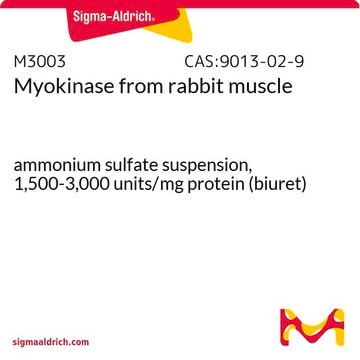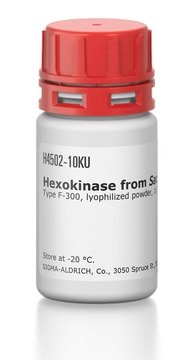N2635
Nucleoside 5′-Diphosphate Kinase from bovine liver
buffered aqueous glycerol solution, ≥1,000 units/mg protein (biuret)
别名:
NDK, UDPkinase, nonmetastatic23(NM23), uridine diphosphate kinase, ATP:nucleoside diphosphate phosphotransferase, NDPK
登录查看公司和协议定价
所有图片(1)
About This Item
CAS号:
MDL號碼:
分類程式碼代碼:
12352204
eCl@ss:
32160410
NACRES:
NA.54
推荐产品
生物源
bovine liver
形狀
buffered aqueous glycerol solution
比活性
≥1,000 units/mg protein (biuret)
儲存條件
(Tightly closed)
技術
activity assay: suitable
異物活動
lactic dehydrogenase, myokinase, β-NADH oxidase, nucleoside monophosphokinase and ATPase ≤0.1%
儲存溫度
2-8°C
相关类别
一般說明
Research area: Cell Signaling
Nucleoside 5′-Diphosphate Kinase (NDK) is a ubiquitous housekeeping enzyme. Nucleoside Diphosphate Kinase exists in two isoforms in eukaryotic cells, NDK-A and NDK-B. These enzymes are found expressed both in the mitochondria and the cytoplasm.
Nucleoside 5′-Diphosphate Kinase (NDK) is a ubiquitous housekeeping enzyme. Nucleoside Diphosphate Kinase exists in two isoforms in eukaryotic cells, NDK-A and NDK-B. These enzymes are found expressed both in the mitochondria and the cytoplasm.
應用
Nucleoside 5′-Diphosphate Kinase has been used:
- nucleoside diphosphate kinase (NDPK) assays
- coupled NDPK-luciferase assay to determine the amounts of Ras-bound guanosine triphosphate (GTP)
- non-metastatic protein 23 (NM23) growth stimulation assay
- in a study to assess inhibition of type I Fc epsilon receptor mediated Ca2+ influx and mediator secretion in rat mucosal mast cells
- in a study to investigate protein synthesis in rabbit reticulocytes
生化/生理作用
Nucleoside 5′-Diphosphate Kinases (NDKs) aid in the synthesis of nucleoside triphosphates (NTPs) by transferring a phosphate group from ATP to nucleoside diphosphates (NDPs). NDKs provide NTPs for nucleic acid synthesis, cytidine 5′-triphosphate (CTP) for lipid synthesis, uridine 5′-triphosphate (UTP) for polysaccharide synthesis, and guanosine triphosphate (GTP) for protein elongation, signal transduction, and microtubule polymerization.
單位定義
One unit will convert 1.0 μmole each of TDP and ATP to TTP and ADP per min at pH 7.6 at 25 °C in a coupled system with PK/LDH.
抗體
相關產品
产品编号
说明
价格
儲存類別代碼
10 - Combustible liquids
水污染物質分類(WGK)
WGK 3
閃點(°F)
Not applicable
閃點(°C)
Not applicable
其他客户在看
Maja Herak Bosnar et al.
Molecular and cellular biochemistry, 329(1-2), 63-71 (2009-04-18)
The family of Nm23/NDPK (nucleoside diphosphate kinase) proteins regulates a vast variety of cellular processes and, therefore, participates in important physiological events like proliferation, differentiation, molecular transport, and apoptosis. The majority of experimental data concerning this gene family has been
Rob U Onyenwoke et al.
Molecular biology of the cell, 23(2), 381-389 (2011-11-25)
AMP-activated protein kinase (AMPK) is a key energy sensor that regulates metabolism to maintain cellular energy balance. AMPK activation has also been proposed to mimic benefits of caloric restriction and exercise. Therefore, identifying downstream AMPK targets could elucidate new mechanisms
Krisztina Takács-Vellai et al.
Cellular and molecular life sciences : CMLS, 72(8), 1447-1462 (2014-12-30)
In textbooks of biochemistry, nucleoside diphosphate conversion to a triphosphate by nucleoside diphosphate 'kinases' (NDPKs, also named NME or NM23 proteins) merits a few lines of text. Yet this essential metabolic function, mediated by a multimeric phosphotransferase protein, has effects
S Hemmerich et al.
Biochemistry, 30(6), 1523-1532 (1991-02-12)
Type I Fc epsilon receptor (Fc epsilon RI) mediated Ca2+ uptake and secretion of rat serosal mast cells have been shown to be inhibited by disodium 1,3-bis [(2'-carboxylatochromon-5'-yl) oxy]-2-hydroxypropane (disodium cromoglycate, DSCG), which is widely employed in the treatment of
Shaobai Huang et al.
Annals of botany, 96(4), 703-715 (2005-07-20)
Anoxia-tolerant plant tissues synthesize a number of proteins during anoxia, in addition to the 'classical anaerobic proteins' involved in glycolysis and fermentation. The present study used a model system of rice coleoptile tips to elucidate patterns of protein synthesis in
我们的科学家团队拥有各种研究领域经验,包括生命科学、材料科学、化学合成、色谱、分析及许多其他领域.
联系技术服务部门








